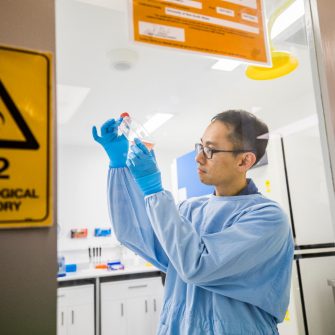Master of Engineering (Renewable Energy)
- Commencing Terms
- Term 1, 2 & 3
- Duration
- 2 Year(s)
- Delivery Mode
- Face-to-face (includes blended)
- Campus
-
Kensington
- Codes
- Program code 8621
- CRICOS code 067604G
-
2026 Indicative first year full fee
- $45,000*
-
2026 Indicative full fee to complete degree
- $92,500*
-
2026 Indicative first year full fee
- $61,000*
-
2026 Indicative full fee to complete degree
- $127,000*

Application closures for 2026
International applications for all undergraduate programs, as well as postgraduate programs offered by the faculties of Arts, Design & Architecture, Engineering (excluding Master of Information Technology and associated programs) and Science are now closed to New Overseas Student Commencement (NOSC) for 2026 intakes.
Postgraduate programs offered by the Business School and the faculties of Law & Justice and Medicine & Health remain open. Master of Information Technology (and associated programs) also remain open.
- Overview
- Entry requirements
- What will I study?
- Future careers
- How to apply
- Fees & Scholarships
Overview
The Master of Engineering (Renewable Energy) is a two-year full-time degree that will help you develop specialised skills and knowledge for a successful career in Renewable Energy with recognised accreditation+. Designed for students who don't have a formal engineering accreditation but have completed undergraduate study, this degree will help you develop job prospects through specialisation, retraining or cross-training. During your study you’ll study targeted courses in renewable energy and energy efficiency.
The Master of Engineering in Renewable Energy enables students to specialise and gain depth of knowledge in areas related to renewable energy technologies, systems engineering, energy efficiency, and assessment frameworks.
Taught at Australia’s #1 Engineering and Technology faculty (QS World University Rankings by Subject, 2025), you’ll have the flexibility to specialise in one area or broaden your knowledge in other areas of engineering. Exciting and practical, this degree features complex, open-ended enquiry-based projects as well as a range of opportunities to help you become a leader in your field.
Graduates of this postgraduate degree significantly extend their knowledge and skills in this highly sought-after area of engineering. If you’re an engineer interested in the expanding renewable energy and photovoltaics industries you can develop your existing skills or refocus in the direction of renewable energy technologies, systems and integration with existing energy systems.
+The Master of Engineering (Renewable Energy) is provisionally accredited by Engineers Australia.
Why study at UNSW?
If you want to lead the change in the way we produce energy, UNSW is a great place to develop specialised expertise. The School of Photovoltaic and Renewable Energy Engineering (SPREE) is a leading provider of world class education and research, specialising in education for both undergraduate and postgraduate students. We produce internationally acclaimed research and work closely with industry to provide innovative solutions to the growing renewable energy sector.
We're ranked #1 in Australia and #25 globally for Engineering and Technology. All eight of UNSW's Engineering schools are ranked in the global top 50 with two schools ranked in the global top 10 for Engineering subjects (QS World University Rankings by Subject, 2025).
We offer innovative teaching techniques to enhance your learning including the 'Virtual Production Line' and 'Virtual World Solar Car Challenge'. Our school is well equipped for world-leading research with the Tyree Energy Technology Building and the Solar Industrial Research Facility. The laboratories at the Tyree Energy Technology Building offer capabilities in deposition, etching, structuring, simulation, and metrology tools for a range of photovoltaic and renewable energy research and hands-on learning.
Our research and education programs are helping transition energy systems across the world towards clean renewable and efficient use of energy. Benefits of studying with us include:
- Our research has produced world record solar cells for a range of materials and technologies
- Our academics are world experts in their fields and internationally respected and recognised
- We focus on translating research into practice so your learning is hands-on and up to the minute
- Since 1974 UNSW is the world leader in photovoltaic research, holding the world record for the highest efficiency silicon solar cell for more than three decades
- UNSW is known for its graduate employability, with UNSW awarded the Most Employable students for((rank.AFR-TOP-100-NUMBER-YEARS) (Australian Financial Review (AFR) Top100 Future Leaders Awards, 2020–2026)
- Industry partners include Suntech, China Sunergy, LG Electronics, Schmid, BlueScope, Ergon Energy and Solar Citizens
Want to see more from UNSW Engineering?
Entry requirements
Admission to this program requires at least one of the following:
- A 4-year Bachelor of Engineering degree (or equivalent) in a cognate discipline* that is not completed in Australia with a minimum credit average (equivalent to a UNSW WAM of 65);
- A 3-year Engineering Science degree in a cognate discipline* with a minimum credit average (equivalent to a UNSW WAM of 65).
*Due to the broad range of applications for the renewable energy field, all engineering disciplines are considered cognate.
Admission pathways
UNSW Global has university pathway programs that provide seamless transition to UNSW Sydney so you can achieve your academic and career goals. Learn more.
English language requirements
You may be asked to provide evidence of your English proficiency to study at UNSW depending on your educational background and citizenship. English language skills are vitally important for coping with lectures, tutorials, assignments and examinations - this is why UNSW requires a minimum English language competency for enrolment.
If you’re completing an Australian Year 12 qualification (e.g. NSW HSC or equivalent), you do not need to provide anything extra to prove your proficiency. Your qualification will be used as evidence of your English proficiency.
If you do need to provide evidence of your English proficiency, this will be indicated in your application. You can prove this by providing evidence that you meet one or more of the following criteria:
- English language tests and university English courses
- Prior study in the medium of English
- Other qualifications
If you need to improve your English skills before you start your degree, UNSW College’s Academic English Programs are for you. The programs are suitable for various English levels and help you prepare for university studies and life in Australia.
For more details, visit the English Language Requirements page.
Admission to this program requires one of the following:
4-year non-accredited Bachelor of Engineering degree (or equivalent) in a cognate discipline with a minimum 65% average;
or
3-year Bachelor of Engineering Science degree in a cognate discipline, at least equivalent to the first three years of an Engineering degree with a minimum 75% average.
Cognate disciplines
Cognate disciplines include:
- Computer Engineering
- Computer Systems Engineering
- Electrical and Renewable Energy
- Electrical and Renewable Power
- Electrical and Telecommunication Engineering
- Electrical Engineering
- Electrical Engineering (Renewable Energy)
- Electronics Engineering
- New Energy Science and Engineering
- Photovoltaic and Solar Energy Engineering
- Photovoltaic Engineering
- Power Electronics
- Power Engineering
- Power Generation and Renewables
- Renewable and Sustainable Energy
- Renewable Energy
- Renewable Energy Systems
- Solar and Renewable Energy
- Solar Energy
- Solar Engineering
- Telecommunication Engineering
English language requirements
You may be asked to provide evidence of your English proficiency to study at UNSW depending on whether you are from an English-speaking background or non-English speaking background. English language skills are vitally important for coping with lectures, tutorials, assignments and examinations - this is why UNSW requires a minimum English language competency for enrolment.
If English is not your first language, you’ll need to provide proof of your English proficiency before you can be given an offer to study at UNSW. You can do this by providing evidence that you meet one or more of the following criteria:
- English language tests and university English courses
- Prior study in the medium of English
- Other qualifications
If you need to improve your English skills before you start your degree, UNSW College’s Academic English Programs are for you. The programs are suitable for various English levels and help you prepare for university studies and life in Australia.
For more details, visit the English Language Requirements page.
Check the specific English language requirements for this program
What will I study?
UNSW is introducing a new academic calendar from 2028.
We are moving to a new flex-semester calendar. What does this mean for your studies?
Program structure
The Master of Engineering is a two-year degree, which can be studied part time or full time. In this degree you’ll gain a solid background in an area of your choice.
The structure of this degree provides the opportunity for students to specialise in an area of interest while gaining a depth of knowledge across a broad range of topics. This degree serves as an entry point to move into the Engineering Profession.
With a strong component of industrial, on-the-job training, our program structure includes:
60 days of industrial training
Six disciplinary knowledge courses
Five advanced disciplinary knowledge courses
Two engineering and technical knowledge courses
One design course
A research project
Full program structure
Degree structures can vary depending on your specialisation of choice, the number of courses you choose and timetabling, to give you an indication you can consider the below.
In your first year you'll study :
Disciplinary Knowledge courses, these are introductory courses where you’ll learn the fundamentals of your chosen specialisation
You may also start studying some of your Advanced Disciplinary Knowledge courses where you’ll be able to tailor your degree to your interest by selecting courses which align with your career goals.
In the second year, you’ll complete the remaining Disciplinary and Advanced Disciplinary Knowledge courses, and study:
Engineering and Technical Management courses which help you build skills in project and or staff management, leadership and strategy.
A design course which is specific to your chosen specialisation – in this course you will be assigned a design task relevant on an area of your studies.
At the end of your degree you’ll bring together all the Engineering principles you’ve learnt to solve complex, open ended problems such as the development of a specific design, process and/or the investigation of a hypothesis.
This degree requires you to complete 60 days of Industrial Training, which gives you some on the job experience before graduating, enabling you to develop the essential technical and professional skills, so you thrive in your future career.
Future careers
Career opportunities in the renewable energy sector are almost limitless. Across the world there’s rapid growth in the sector especially photovoltaics and wind, the most low-cost technologies to generate electricity. With a shift towards more efficient use of energy, energy storage and electrification of the transport sector, renewable energy engineers are now more in demand than ever.
Upon graduation with specialised renewable energies expertise under your belt there are a range of roles graduates can pursue. Potential roles include:
- PE & RE system design, analysis and construction
- Policy, financing, marketing and energy markets
- Engineering consulting and project management
- Solar architecture, energy-efficient building design
- Energy efficiency
- Manufacturing, quality control and reliability
- Research and development
Accreditation
The Master of Engineering (Renewable Energy) is provisionally accredited by Engineers Australia, this means the program meets the accreditation criteria to the extent possible at the time of the evaluation and will likely receive full accreditation when a representative group of graduates have emerged.
This degree includes a practical component where you’ll apply your knowledge in practical settings through 60 days of approved industrial training in Australia or overseas.
How to apply
Applications must be submitted through our Apply Online portal. We encourage you to submit your completed application as early as possible to ensure it will be processed in time for your preferred term. Some high-demand programs and Faculties with limited places may have an earlier application deadline or commencement date. Find out more.
Ready to start your application?
For most international students, applications are submitted via our Apply Online service. We encourage you to submit your completed application as early as possible to ensure it will be processed in time for your preferred term.
Some high-demand programs with limited places, may have an earlier application deadline or may have an earlier commencement date. For details, visit the international admissions information page.
Ready to start your application?
Fees & Scholarships
*Fees are subject to annual review (or when required) by the University and may vary accordingly.
Indicative fees are a guide only and have been calculated based on the typical enrolment patterns of students undertaking the program. The indicative fees listed here is an estimate for tuition only and excludes non-tuition fees and charges. The amount you pay will vary depending on the calendar year of enrolment, the courses you select and whether your study load is more or less than 1 Equivalent Full Time Student Load (48 units of credit (UOC) per year).
You should not rely on indicative fees as fee increases are assessed when required and may exceed the indicative figures listed here. Actual fees are calculated on enrolment. More information on fees can be found at the UNSW fees website.
*Fees are subject to annual review by the University and may increase annually, with the new fees effective from the start of each calendar year. The indicative fees listed here are based on an estimated average and are for tuition only, other fees and charges are not included. The amount you pay will vary depending on the calendar year to enrol, the courses you select and whether your study load is more or less than 1 Equivalent Full Time Student Load (8 courses per year).
Indicative fees are a guide for comparison only based on current conditions and available data. You should not rely on indicative fees. More information on fees can be found at the UNSW fees website.
Indicative fees to complete the program have been calculated based on a percentage increase for every year of the program. Fee increases are assessed annually and may exceed the indicative figures listed here.
Indicative fees to complete the program include tuition plus an estimate of study-related costs of approximately $1,000 per year. To find out more about other costs, visit UNSW International.
Scholarships
At UNSW, we award over $83 million in scholarships each year. We pride ourselves on rewarding excellence and making university accessible to students from all walks of life. Whether you’re a domestic or international student, our range of scholarships, prizes and awards can support your journey.
Featured scholarship
The UNSW Women in Engineering Research Scholarship was established to assist women of high academic achievement with an interest in a research and/or an academic career in engineering. UNSW Engineering offers two Women in Engineering Top-up Scholarships every semester.
Apply here and search for ‘Engineering’ in the keywords.
Progress starts here – at a world-leading university

Top 20 Worldwide
UNSW is ranked #20 university in the world
QS World University Rankings, 2024–2026

Most Employable Graduates
Winner of the AFR Most Employable University Award seven years in a row
AFR Top100 Future Leaders Awards, 2020–2026

Australia's #1 for Innovation
Highest number of startups and spinouts from university-developed tech
SCOPR report, 2024




